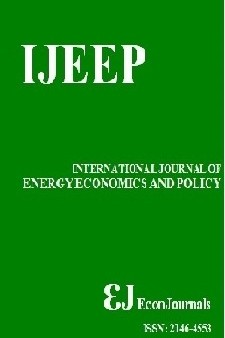Economic and Technical Feasibility of Metering and Sub-metering Systems for Heat Accounting
Economic and Technical Feasibility of Metering and Sub-metering Systems for Heat Accounting
energy efficiency, heat accounting, cost efficiency.,
- Başlangıç: 2011
- Yayıncı: İlhan ÖZTÜRK
Economic and Technical Feasibility of Metering and Sub-metering Systems for Heat Accounting
Luca CELENZA, Marco DELL’ISOLA, Giorgio FİCCO, Marco GRECO, Michele GRİMALDİ
Assessment of the Required Changes of Russian Ecological Taxes
Tatiana Olegovna TAGAEVA, Alexander Olegovich BARANOV, Vadim Manavirovich GİLMUNDİNOV
Wajahat Ali, Azrai Abdullah, Muhammad Azam
Ernesto SOMMA, Alessandro RUBİNO
Analysis of Income Elasticities of Brazil’s Energy Matrix
Marcos Gonçalves PERRONİ, Sérgio Eduardo Gouvêa Da COSTA, Wesley Vieira Da SİLVA, Edson Pinheiro De LİMA, Claudimar Pereira Da VEİGA
The Convergence Behavior of CO2 Emissions in Seven Regions under Multiple Structural Breaks
Uncertainty of Oil Proved Reserves and Economic Growth in Iran
Elaheh Asadi Mehmandosti, Fatemeh Bazzazan, Mir Hossein Mousavi
Barriers to Energy Saving for Public Middle Schools in Bangkok: From School Management Perspective
Wuttipan KİATRUANGKRAİ, Ekachai LEELARASMEE
Lyubov Vasilievna LARCHENKO, Roman Aleksandrovich KOLESNİKOV, Galina Pavlovna TUMANOVA, Valeriy Aleksandrovich KİBENKO
China in Innovative Development of Alternative Energy Advanced Industrial Technologies
Mihail Nikolaevich DUDİN, еvgenia еvgenevna FROLOVA, Petr Aleksandrovich KUCHERENKO, Vitaly Aleksandrovic VERNİKOV, Natalia Andreevna VOYKOVA
